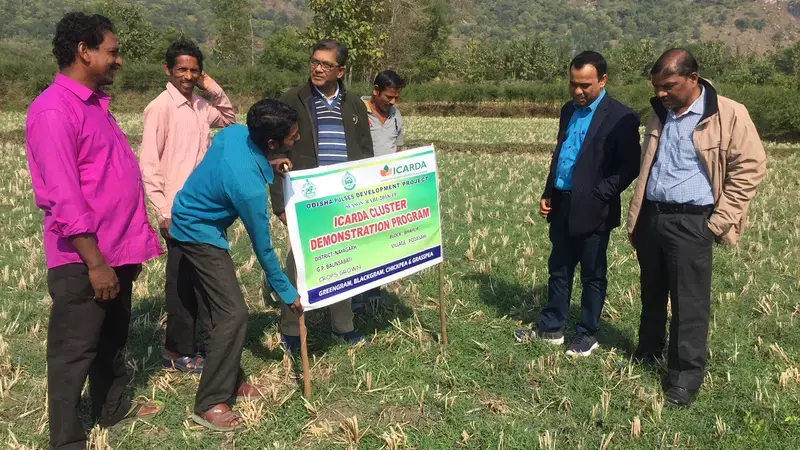New ICARDA projects in India boost rural livelihoods

Pulse technology delivery: Farmer enthusiasm in the State of Odisha in eastern India
Farmers First! With this concept, ICARDA is operating two Government of Odisha-funded farmer-centric projects in the state of Odisha, an eastern Indian state, where agriculture is the main livelihood option of the majority of its population. Innovative and affordable interventions are critical to improve the livelihoods of smallholder farmers at a time when needs for increased production have skyrocketed and the state pulses deficit has reached around 70 percent.
One of the two ICARDA-led ‘Farmers First’ projects, is the Odisha Pulse mission. This entails the promotion of new pulses technologies among farmers in this eastern Indian state. The aim is to help the smallholder farmers reduce yield gap and expand their activities through exploring the potential of making use of fallow lands.
Promotion of spineless cactus and grasspea for human consumption as well as for animal fodder is the second project in Odisha where ICARDA is working with the State Government to improve rural health and nutrition. These alternative crops aim to address the general wellbeing of farmers and addressing a prevailing fodder deficit.
Providing improved technologies, farmer empowerment through knowledge sharing, value addition of raw products of pulses, quality seed production, and mixing green fodder with rice straw in animal ration, etc. are the major components of both projects in the Farmers First operations.
During December 2018, ICARDA and Odisha state government officials went to remote villages to visit the concerned traditional, tribal farmer communities. The delegation spoke to the men and women who are facing the daily and often tough challenges to feed their families and livestock.
“This visit was a unique chance to link the rural communities up with policy makers as well as to show them what has been done and what still needs to be addressed. There is no doubt that new technologies and skills are having significant impact. Still, much more needs to be done in order to help the farmers improve their lives and livelihoods and make them more resilient,” tells Ashutosh Sarker, head of the ICARDA Food Legume Research Platform and Coordinator of the South Asia and China Regional Program.
In Odisha state, ICARDA is currently facilitating the distribution of improved pulses varieties that are suitable to the particular conditions in the area. These include Moitree and HUL-57 lentils; new grasspea varieties introduced in the area are Ratan, Prateek; and Barimung-6 as a new mungbean variety.
“It is clear that the farmers are keen to adopt and expand pulses technologies and to grow spineless cactus and grasspea in unused lands. This is very encouraging. We also saw good results from pulses crops where farmers use the recommended production technologies as seed priming, use of biofertilizers and seed treatments. Whenever available, they also make use of machines for planting pulse crops. Last but not least, we experience that farmers are keen to share knowledge and technologies to non-participating farmers which will have an impact beyond the targeted communities,” says Ashutosh Sarker.
For more information, please contact: Ashutosh Sarker, Head, ICARDA Food Legume Research Platform and Coordinator, South Asia and China Regional Program
